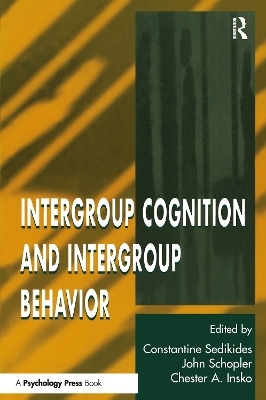
Intergroup Cognition and Intergroup Behavior
Psychology Press (Verlag)
978-0-8058-2056-0 (ISBN)
Social psychology has maintained a keen interest over the years in issues related to intergroup behavior, such as ingroup favoritism and discrimination. The field has also been preoccupied with ways to reduce prejudice and discrimination. Intergroup contact has been offered as the main mechanism for prejudice and discrimination reduction. In the last 15 years, the social cognitive perspective has been applied to the study of intergroup relations. Theoretical advances have been made regarding such issues as the representation of information about ingroup and outgroup members, the structural properties of stereotypes, the relation between cognitive representation and judgment, and the ways in which cognition, effect, and motivation interactively influence the perception, judgment, and memory of ingroup and outgroup members.
The first volume in this new series, this book seeks to bring the above two traditions together. Focusing on the interplay between cognition and behavior in intergroup settings, it addresses four general questions:
* How does intergroup cognition (perceptions, judgments, and memories) influence intergroup behavior (ingroup favoritism and discrimination)?
* How does intergroup behavior subsequently change intergroup cognition?
* What is the mediational role of effect, motivational processes, and social context?
* How effective can change in intergroup cognition be in altering intergroup behavior?
This volume focuses not on a specific theory but rather on an approach. This approach is the interface between intergroup cognition and intergroup behavior. The various contributors are leading investigators in these areas and share the belief that the field has reached a level of maturity where it can start asking the hard questions regarding the complex and multifaceted ways in which intergroup cognition and behavior are related. The investigators do not just summarize their work. Instead, they connect aspects of their work to the theme of the volume and integrate their work with existing approaches in the relevant literature.
Chester A. Insko, Constantine Sedikides, John Schopler, Chester Insko
Contents: C. Sedikides, J. Schopler, C.A. InskoIntroduction. Part I:Intergroup Cognition and Intergroup Behavior: Conceptual Issues.M. Schaller, M.C. Rosell, C.H. Asp, Parsimony and Pluralism in the Psychological Study of Intergroup Processes. D. Wilder, A.F. Simon, Categorical and Dynamic Groups: Implications for Social Perception and Intergroup Behavior. Part II:Interindividual Versus Intergroup Cognition and Behavior.D.L. Hamilton, S.J. Sherman, B. Lickel, Perceiving Social Groups: The Importance of the Entitativity Continuum. C.A. Insko, J. Schopler, Differential Distrust of Groups and Individuals. C.A. Insko, J. Schopler, C. Sedikides, Personal Control, Entitativity, and Evolution. Part III:Processes Affecting Intergroup Cognition and Intergroup Behavior: Perceptual and Judgmental Processes.P.W. Linville, G.W. Fischer, Group Variability and Covariation: Effects on Intergroup Judgment and Behavior. M. Biernat, T.K. Vescio, M. Manis, Judging and Behaving Toward Members of Stereotyped Groups: A Shifting Standards Perspective. B. Wittenbrink, B. Park, C.M. Judd, The Role of Stereotypic Knowledge in the Construal of Person Models. Part IV:Processes Affecting Intergroup Cognition and Behavior: Motivational and Social Processes.T. Clare, S.T. Fiske, A Systemic View of Behavioral Confirmation: Counterpoint to the Individualist View. R.M. Kramer, D.M. Messick, Getting By With a Little Help From Our Enemies: Collective Paranoia and Its Role in Intergroup Relations. B. Simon, Individuals, Groups, and Social Change: On the Relationship Between Individual and Collective Self-Interpretations and Collective Action. J.M. Levine, R.L. Moreland, C.S. Ryan, Group Socialization in Intergroup Relations. Part V:On the Reduction of Unwanted Intergroup Cognition and Behavior.G.V. Bodenhausen, C.N. Macrae, J. Garst, Stereotypes in Thought and Deed: Social-Cognitive Origins of Intergroup Discrimination. J.F. Dovidio, S.L. Gaertner, A.M. Isen, M. Rust, P. Guerra, Positive Affect, Cognition, and the Reduction of Intergroup Bias. M. Hewstone, C.G. Lord, Changing Intergroup Cognitions and Intergroup Behavior: The Role of Typicality. N. Miller, L.M. Urban, E.J. Vanman, A Theoretical Analysis of Crossed Social Categorization Effects. Part VI:Concluding Commentary.D.M. Mackie, E.R. Smith, Intergroup Cognition and Intergroup Behavior: Crossing the Boundaries.
| Erscheint lt. Verlag | 12.1.1998 |
|---|---|
| Reihe/Serie | Applied Social Research Series |
| Verlagsort | Philadelphia |
| Sprache | englisch |
| Maße | 152 x 229 mm |
| Gewicht | 657 g |
| Themenwelt | Geisteswissenschaften ► Psychologie ► Allgemeine Psychologie |
| Geisteswissenschaften ► Psychologie ► Sozialpsychologie | |
| Geisteswissenschaften ► Psychologie ► Verhaltenstherapie | |
| ISBN-10 | 0-8058-2056-6 / 0805820566 |
| ISBN-13 | 978-0-8058-2056-0 / 9780805820560 |
| Zustand | Neuware |
| Informationen gemäß Produktsicherheitsverordnung (GPSR) | |
| Haben Sie eine Frage zum Produkt? |
aus dem Bereich


